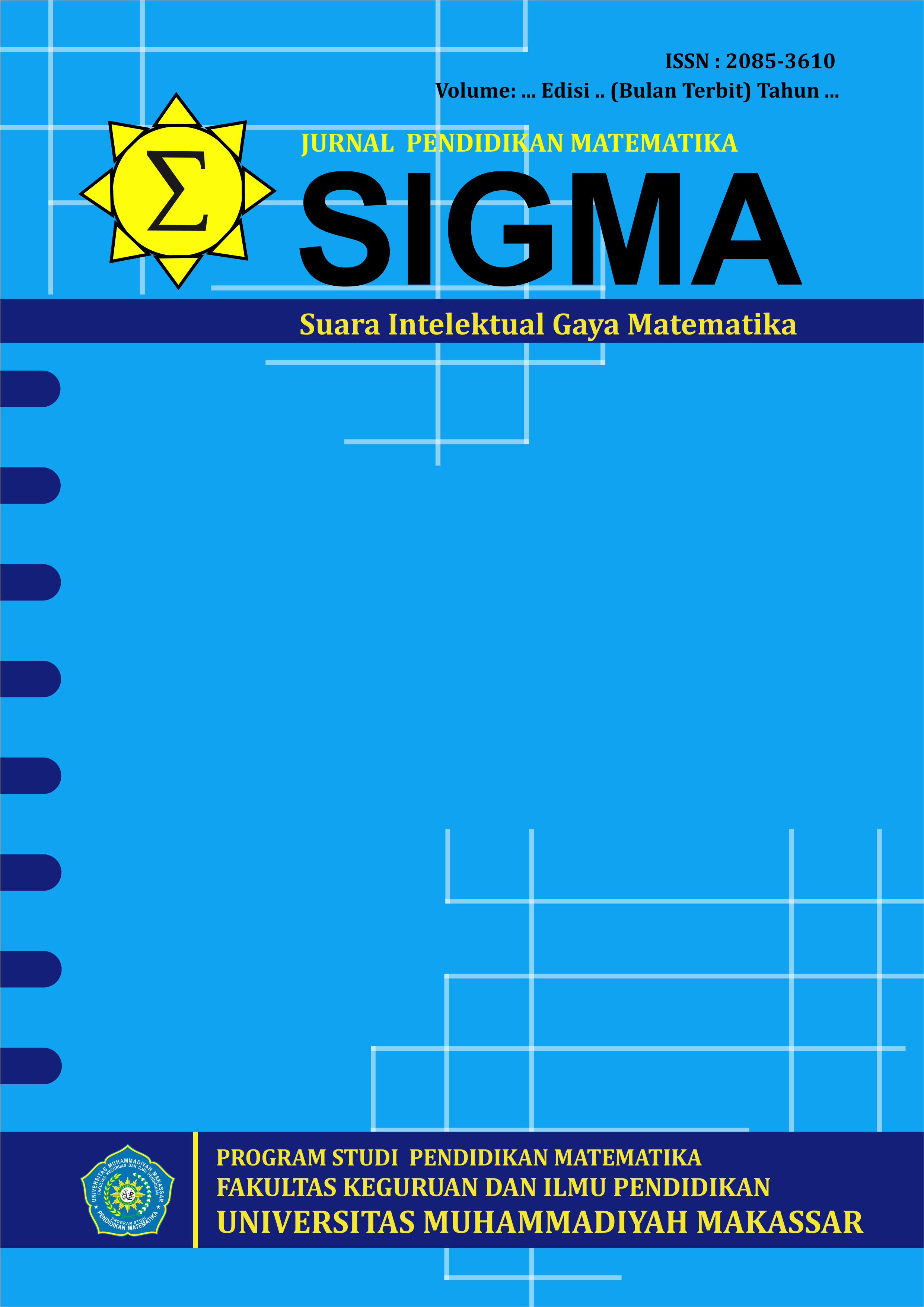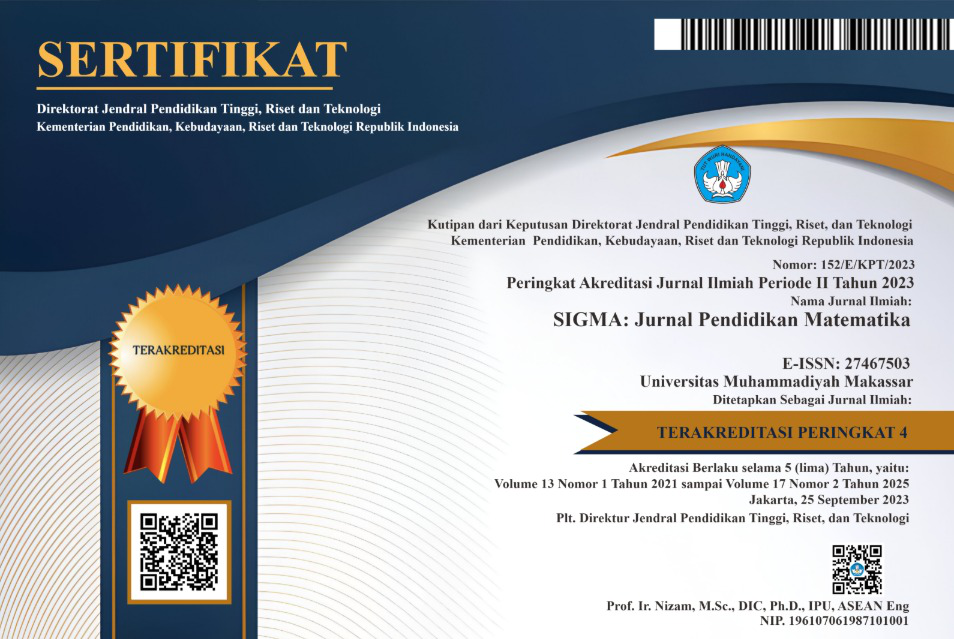APPLICATION OF AN OPEN MATHEMATICAL PROBLEM-ORIENTED PROBLEM-BASED LEARNING MODEL IN INFLUENCING PROBLEM-SOLVING ABILITY AND MATHEMATICAL DISPOSITION
DOI:
https://doi.org/10.26618/sigma.v16i1.13032Keywords:
Mathematics, problem-based learning, problem solving, mathematical dispositionAbstract
The improvement in students’ problem-solving ability and mathematical disposition is a highlight, especially in geometry transformation materials. This is because the learning model still uses conventional methods that emphasize students following and waiting for the direction of the teacher. This study aimed to analyze the effectiveness of problem-based learning models oriented toward open mathematical problems on the problem-solving ability and mathematical disposition of students in SMA Negeri 1 Susut. A pseudoexperimental study with a posttest-only control group design was conducted by comparing the provision of PBL and conventional learning models. The instruments used are tests and questionnaires. There are 5 items and 25 statements that meet the criteria of very high reliability. Data collection techniques in this study used test and questionnaire methods. The sample consisted of 60 students, 30 each as a control and an experiment. Data were collected using questionnaires and analyzed using MANOVA (p<0.05). The results indicate that the application of PBL models oriented towards open mathematical problems is significantly more effective than conventional learning models in improving students' problem-solving abilities and mathematical dispositions both partially and simultaneously. The application of this learning model has led to an increase in perseverance, interest, and curiosity, which are essential for problem-solving with teachers as facilitators
References
Adnyana, I. M. D. M. (2021). Populasi dan Sampel. In M. Darwin (Ed.), Metode Penelitian Pendekatan Kuantitatif (1st ed., pp. 103–116). CV. Media Sains Indonesia.
Adnyana, I. M. D. M., & Sudaryati, N. L. G. (2022). The potency of green education-based blended learning in biology students at the Hindu University of Indonesia. BIO-INOVED: Jurnal Biologi-Inovasi Pendidikan, 4(1), 1–9. https://doi.org/10.20527/bino.v4i1.11047
Aini, N., Junıatı, D., & Siswono, T. (2020). Exploring the combinatorial reasoning of high school students with reflective and impulsive cognitive style in solving problems (pp. 1113–1124). Genç Bilge Yayıncılık. https://doi.org/10.17478/jegys.768023
Apriliana, L. P., Handayani, I., & Awalludin, S. A. (2019). The effect of a problem centered learning on student’s mathematical critical thinking. JRAMathEdu (Journal of Research and Advances in Mathematics Education), 4(2), 124–133. https://doi.org/10.23917/jramathedu.v4i2.8386
Argaw, A. S., Haile, B. B., Ayalew, B. T., & Kuma, S. G. (2017). The effect of problem-based learning (PBL) instruction on students’ motivation and problem-solving skills of physics. Eurasia Journal of Mathematics, Science and Technology Education, 13(3), 857–871. https://doi.org/https://doi.org/10.12973/eurasia.2017.00647a
As’ari, A. R., Kurniati, D., Abdullah, A. H., Muksar, M., & Sudirman, S. (2019). Impact of infusing truth-seeking and open-minded behaviors on mathematical problem-solving. Journal for the Education of Gifted Young Scientists, 7(4), 1019–1036. https://doi.org/https://doi.org/10.17478/jegys.606031
Benedicto, P. N., & Andrade, R. (2022). Problem-Based learning strategies and critical thinking skills among pre-service teachers. International Journal of Science, Technology, Engineering and Mathematics, 2(2), 1–28. https://doi.org/10.53378/352885
Darwin, M., Mamondol, M. R., Sormin, S. A., Nurhayati, Y., Tambunan, H., Sylvia, D., Adnyana, I. M. D. M., Prasetiyo, B., Vianitati, P., & Gebang, A. A. (2021). Quantitative approach research method (T. S. Tambunan, Ed.; 1st ed.). CV Media Sains Indonesia.
Deavy Martyaningrum, I., & Rachmani Dewi, N. (2018). The enchancement of students’ ability in the aspect of problem solving and mathematical disposition through brain-based learning model. Unnes Journal of Mathematics Education, 7(1), 31–38. https://doi.org/10.15294/ujme.v7i1.21854
Eliza, R., Fauzan, A., Lufri, L., & Yerizon, Y. (2019). The validity of realistic problem-based learning model development of mathematics learning in vocational high school (SMK). 1st International Conference of Innovation in Education (ICoIE 2018), 12–18. https://doi.org/10.2991/icoie-18.2019.4
Fauziah, A., Putri, R. I. I., Zulkardi, & Somakim. (2017). Primary school student teachers’ perception to Pendidikan Matematika Realistik Indonesia (PMRI) instruction. Journal of Physics: Conference Series, 943(1), 12044. https://doi.org/10.1088/1742-6596/943/1/012044
Gusmaulia, A., Putri, E., & Priyadi, R. (2023). Differences in the mathematical disposition of students who took the course and did not take the course: which is better?. JPMI – Jurnal Pembelajaran Matematika Inovatif, 6(4), 1505–1512. https://doi.org/10.22460/jpmi.v6i4.17301
Hidayatsyah, H., Hidayat, A., & Elisyah, N. (2023). Students' Mathematical Disposition Ability Using GeoGebra-Assisted Problem Based Learning Model. Jurnal Cendekia: Jurnal Pendidikan Matematika, 7(2), 1915–1923. https://doi.org/10.31004/cendekia.v7i2.2425
Jabarullah, N. H., & Iqbal Hussain, H. (2019). The effectiveness of problem-based learning in technical and vocational education in Malaysia. Education & Training, 61(5), 552–567. https://doi.org/10.1108/ET-06-2018-0129
Jin, Y. Q., Lin, C.-L., Zhao, Q., Yu, S.-W., & Su, Y.-S. (2021). A study on traditional teaching method transferring to e-learning under the covid-19 pandemic: from Chinese students’ perspectives. Frontiers in Psychology, 12(1), 90–121. https://doi.org/https://doi.org/10.3389/fpsyg.2021.632787
Kurniawati, I., Setiawan, A., Anwar, M. S., & Muhammad, I. (2023). Analysis of students' problem-solving abilities and mathematical dispositions on SPLDV material. Jurnal Penelitian Tindakan Kelas, 1(2), 124–134. https://www.journal.assyfa.com/index.php/jptk/article/view/200
LaForce, M., Noble, E., & Blackwell, C. (2017). Problem-based learning (PBL) and student interest in STEM careers: the roles of motivation and ability beliefs. Education Sciences, 7(4),92–104). https://doi.org/10.3390/educsci7040092
Liiman, M., Mulyono, M., & Napitupulu, E. E. (2022). Development of mathematics learning tools based on contextual teaching learning approach to improve problem solving ability and mathematical disposition of junior high school students. Jurnal Cendekia: Jurnal Pendidikan Matematika, 7(1), 1844. https://doi.org/10.31004/cendekia.v7i1.1844
Maulana, R., Susilaningsih, E., & Subali, B. (2022). Implementation of problem-based learning model to enhance critical thinking skills on force material in fourth grade elementary school. Journal of Primary Education, 11(2), 274–286. https://journal.unnes.ac.id/sju/index.php/jpe/article/view/71738
Nufus, H., & Mursalin, M. (2020). Improving students’ problem-solving ability and mathematical communication through the application of problem-based learning. Electronic Journal of Education, Social Economics and Technology, 1(1), 43–48. https://doi.org/10.33122/ejeset.v1i1.8
Outside, E., & Classroom, T. H. E. (2023). Exploration of learning experiences and student engagement in mathematics learning outside the classroom. International Journal of Education, 16(2), 79–88. https://doi.org/10.17509/ije.v16i2.48399
Paulus, A. Y., Sulaeman, Mayasari, A. C., Ayu, J. D., Musniati, N., Sari, M. P., Hamdan, D. F., Farid, A., Selly, J. B., Amalia, N., Aulia, U., & Adnyana, I. M. D. M. (2023). Biostatistika Epidemiologi (H. Akbar, Ed.; 1st ed., Issue 1). CV. Media Sains Indonesia.
Purba, R. A. (2022). Hybrid Models with Technology: Is it Effective for Learning in Abnormal Situations? Journal of Education Research and Evaluation, 6(1), 1–9. https://doi.org/10.23887/jere.v6i1.41546
Rahmaputri, S. (2020). Mathematical problem-solving skills: comparison of guided discovery learning models and problem-based learning models. International Journal of Technology Vocational Education and Training, 1(2), 128–136. https://doi.org/10.46643/ijtvet.v1i2.45
Rijken, P. E., & Fraser, B. J. (2023). Effectiveness of project-based mathematics in first-year high school in terms of learning environment and student outcomes. Learning Environments Research, 09477. https://doi.org/10.1007/s10984-023-09477-7
Ruhulessin, S., Ratumanan, T., & Tamalene, H. (2019). Differences in learning outcomes of grade x high school students using the cooperative learning model type Student Facilitator and Explaining (SFE) and conventional learning models on trigonometric material. Jurnal Pendidikan Matematika, 2(1),1-6. https://doi.org/10.30598/jupitekvol2iss1pp1-6
Suliantiani, N. M., Sridana, N., Triutami, T. W., & Soepriyanto, H. (2023). Analysis of anxiety and mathematical disposition of learning outcomes reviewed from the mathematics learning styles of class XI students at SMA Negeri 2 Gerung for the 2022/2023 Academic Year. Jurnal Ilmiah Profesi Pendidikan, 8(3), 1499–1508. https://doi.org/10.29303/jipp.v8i3.1524
Tanjung, S. A. N. H. S. (2022). Development of learning tools based on realistic mathematical approaches to improve the mathematical disposition ability of students of SMA Negeri 4 Wira Bangsa West Aceh Regency. Genta Mulia: Jurnal Ilmiah Pendidikan, 11(2), 4841. https://ojs.fkip.ummetro.ac.id/index.php/matematika/article/view/4841
Ulger, K. (2018). The effect of problem-based learning on the creative thinking and critical thinking disposition of students in visual arts education. Interdisciplinary Journal of Problem-Based Learning, 12(1), 3–6. https://doi.org/https://doi.org/10.7771/1541-5015.1649
Usta, N. (2020). Evaluation of preservice teachers’ skills in solving non-routine mathematical problems through various strategies. Asian Journal of Education and Training, 6(3), 362–383. https://doi.org/10.20448/journal.522.2020.63.362.383
Wibowo, E. (2018). The relationship between anxiety about learning mathematics and the mathematical disposition of students at SMP Negeri 2 Luwuk. PHytagoras: Jurnal Program Studi Pendidikan Matematika, 7(1), 47–54. https://doi.org/10.33373/pythagoras.v7i1.1189
Wulandari, E., & Azka, R. (2018). Welcoming PISA 2018: Developing Mathematical Literacy to Support 21st Century Skills. De Fermat: Jurnal Pendidikan Matematika, 1(1), 31–38. https://doi.org/10.36277/defermat.v1i1.14
Downloads
Additional Files
Published
Issue
Section
License
With the receipt of the article by the SIGMA: Jurnal Pendidikan Matematika Editorial Board and the decision to be published, then the copyright regarding the article will be diverted to SIGMA: Jurnal Pendidikan Matematika.
Universitas Muhammadiyah Makassar as the publisher of SIGMA: Jurnal Pendidikan Matematika hold the copyright regarding all the published articles in this journal.Universitas Muhammadiyah Makassar has the right to multiply and distribute the article and every author is not allowed to publish the same article that was published in this journal.
The manuscript authentic and copyright statement submission can be downloaded ON THIS FORM.






